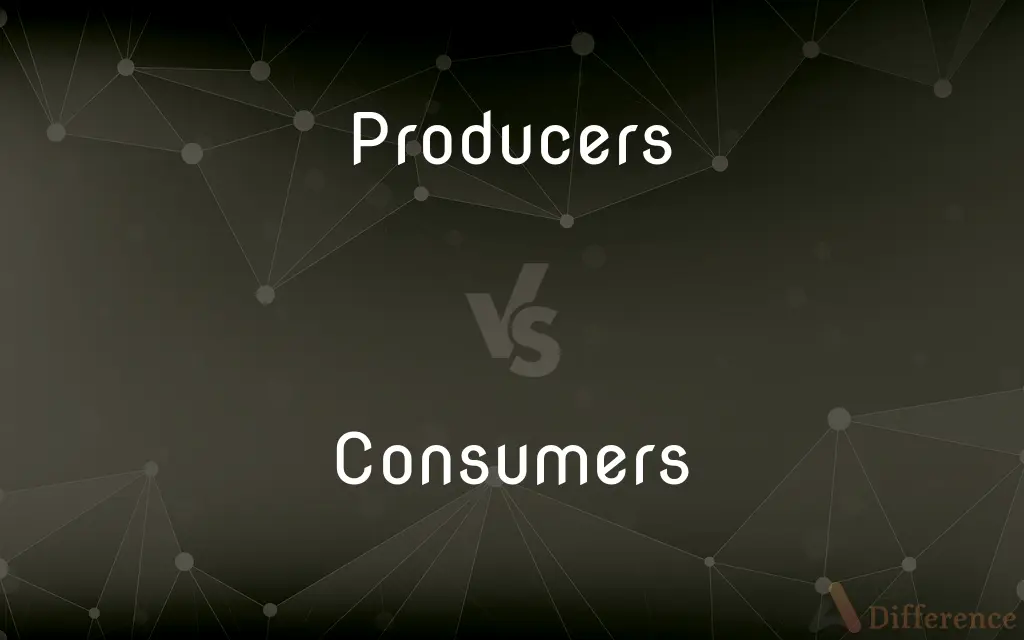Producers vs. Consumers — What's the Difference?
Edited by Tayyaba Rehman — By Fiza Rafique — Published on January 16, 2024
Producers create or supply goods/services, while consumers purchase and use them.

Difference Between Producers and Consumers
Table of Contents
ADVERTISEMENT
Key Differences
Producers are entities that create, grow, or manufacture goods or provide services. They form the foundation of the economy, creating the products that consumers ultimately purchase and use. Consumers are individuals or businesses that use or consume goods and services that are produced. While producers introduce new goods and services to the market, consumers provide the demand that justifies production.
In an economic context, producers often invest in resources to create products efficiently and innovatively. They aim to maximize profit and meet the needs and wants of consumers. Consumers, on the other hand, evaluate products based on quality, price, and need, making choices that can influence producers' decisions and market trends. The dynamic between producers and consumers drives the market economy, with producers responding to consumer demand.
Producers play a key role in employment as they often require labor to create their goods or offer their services. Consumers contribute to the economy primarily through spending, which supports producers by providing revenue. This interdependency shapes the economic landscape, with producers seeking to enhance productivity and consumers looking for the best value for their money.
From an environmental perspective, producers may impact natural resources and sustainability with their production methods. Consumers influence producers by showing preferences for eco-friendly and sustainable products. Through this relationship, consumer demand can lead to more responsible production practices.
In terms of market power, producers can have significant influence over the market by controlling the supply of goods and services. Consumers hold power through their collective purchasing choices, which can impact market prices and production strategies. Both producers and consumers are integral to the functioning of the economy and are influenced by various external factors such as regulations, economic conditions, and technological advancements.
ADVERTISEMENT
Comparison Chart
Role in Economy
Create goods/services.
Purchase/use goods/services.
Influence on Market
Determine supply and innovation.
Drive demand and market trends.
Economic Contribution
Provide jobs, goods, and services.
Support the economy through spending.
Decision Factors
Production cost, market demand, profit margins.
Price, quality, need, preference.
Environmental Impact
May use natural resources, impact sustainability.
Can drive demand for eco-friendly products.
Compare with Definitions
Producers
Producers generate economic value through manufacturing.
The factory is the largest producer of textiles in the region.
Consumers
Consumers are end-users who buy products for personal use.
During the holiday season, consumers shop more than any other time of the year.
Producers
In the entertainment industry, producers oversee production aspects of shows and films.
The film’s success was largely credited to its talented producers.
Consumers
In biology, consumers are organisms that eat other organisms.
Lions are apex consumers in the African savanna ecosystem.
Producers
Producers can also refer to organisms that synthesize food from inorganic substances.
Algae are producers that contribute to the aquatic food chain.
Consumers
Consumers influence product popularity through their purchasing choices.
Young consumers have made eco-friendly products increasingly popular.
Producers
Producers are those who create products for the market.
Local farmers are key producers in the community’s food supply.
Consumers
Consumers have rights protected by consumer laws.
The consumer filed a complaint when the product malfunctioned.
Producers
Producers in a market can dictate trends through innovation.
Tech producers are creating the next generation of smartphones.
Consumers
In economics, consumers are assumed to seek the greatest satisfaction from their purchases.
Consumers are comparing prices before making a purchase.
Producers
One that produces, especially a person or organization that produces goods or services for sale.
Consumers
One that consumes, especially one that acquires goods or services for direct use or ownership rather than for resale or use in production and manufacturing.
Producers
A person who supervises and controls the administrative, financial, and commercial aspects of staging a show or performance or of creating and distributing a video or audio recording.
Consumers
(Ecology) A heterotrophic organism that ingests other organisms or organic matter in a food chain.
Producers
A furnace that manufactures producer gas.
Consumers
Plural of consumer
Producers
(Ecology) An organism, such as a green plant, that produces its own food through photosynthesis or chemosynthesis and constitutes the first trophic level in a food chain; an autotroph.
Producers
Plural of producer
Common Curiosities
What defines a producer in economics?
A producer is an individual or entity that creates goods or provides services.
How do consumers affect producers?
Consumers influence producers by their purchasing decisions, affecting what is produced.
Can a company be both a producer and a consumer?
Yes, companies can produce goods or services and also consume resources in their operations.
How do producers compete?
Producers compete by offering better quality, lower prices, or innovation in their products.
What is consumer behavior?
Consumer behavior is the study of how individuals select and use products.
Why is consumer protection important?
It ensures that consumers are treated fairly and not misled or exploited by producers.
Can consumers be part of the production process?
Yes, through customization and feedback, consumers can influence production.
How does advertising affect producers and consumers?
Advertising can influence consumer choices and producer sales strategies.
Why is the balance between producers and consumers important?
Balance ensures a stable market; too many producers can lead to oversupply, and too many consumers can lead to shortages.
Are consumers responsible for environmental impact?
Yes, consumers have a role by choosing products based on their environmental footprint.
How can producers respond to consumer demands?
Producers analyze market trends and consumer feedback to tailor their products.
What is a primary producer?
In ecology, it’s an organism that produces its own food through photosynthesis or chemosynthesis.
What role do producers play in the global economy?
Producers drive economic growth, innovation, and development on a global scale.
How do consumer preferences change?
Preferences change due to trends, economic factors, and personal tastes.
What’s the difference between individual and institutional consumers?
Individual consumers purchase for personal use, while institutional consumers buy for organizational needs.
Share Your Discovery

Previous Comparison
Prim’s Algorithm vs. Kruskal’s Algorithm
Next Comparison
Red Head Steering Box vs. Blue Top Steering BoxAuthor Spotlight
Written by
Fiza RafiqueFiza Rafique is a skilled content writer at AskDifference.com, where she meticulously refines and enhances written pieces. Drawing from her vast editorial expertise, Fiza ensures clarity, accuracy, and precision in every article. Passionate about language, she continually seeks to elevate the quality of content for readers worldwide.
Edited by
Tayyaba RehmanTayyaba Rehman is a distinguished writer, currently serving as a primary contributor to askdifference.com. As a researcher in semantics and etymology, Tayyaba's passion for the complexity of languages and their distinctions has found a perfect home on the platform. Tayyaba delves into the intricacies of language, distinguishing between commonly confused words and phrases, thereby providing clarity for readers worldwide.












































